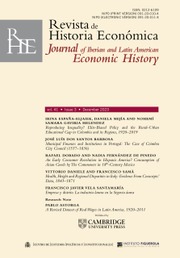No CrossRef data available.
Article contents
FISCAL PESSIMISM IN HISTORICAL PERSPECTIVE: TOCQUEVILLE'S CROSS REVISITED
Published online by Cambridge University Press: 19 March 2021
Abstract
This paper explores Alexis de Tocqueville's thought on fiscal political economy as a forerunner of the modern school of preference falsification and rational irrationality in economic decision making. A good part of the literature has misrepresented Tocqueville as an unconditional optimist regarding the future of fiscal moderation under democracy. Yet, although he initially shared the cautious optimism of most classical economists with respect to taxes under extended suffrage, Tocqueville's view turned more pessimistic in the second volume of his Democracy in America. Universal enfranchisement and democratic governments would lead to higher taxes, more intense income redistribution and government control. Under democracy, the continuous search for unconditional equality would eventually jeopardise liberty and economic growth.
Resumen
Este artículo explora el pensamiento de Alexis de Tocqueville sobre la economía política fiscal como precursor de la escuela moderna de falsificación de preferencias e irracionalidad racional en la toma de decisiones económicas. Tradicionalmente, Tocqueville aparece en la literatura como un pensador optimista sobre los efectos de moderación que la democracia política ejercería sobre el aumento de la presión fiscal. Sin embargo, aunque inicialmente compartió el cauteloso optimismo de la mayoría de los economistas clásicos con respecto a los impuestos bajo el sufragio extendido, la opinión de Tocqueville se volvió más pesimista en el segundo volumen de su Democracia en América. El derecho de voto universal y los gobiernos democráticos conducirían a impuestos más altos, una mayor redistribución y más control gubernamental. Bajo la democracia, la búsqueda continua de la igualdad incondicional pondría en peligro la libertad y el crecimiento económico.
Keywords
- Type
- Articles/Artículos
- Information
- Revista de Historia Economica - Journal of Iberian and Latin American Economic History , Volume 40 , Issue 2 , September 2022 , pp. 349 - 369
- Copyright
- Copyright © The Author(s), 2021. Published by Cambridge University Press on behalf of Instituto Figuerola, Universidad Carlos III de Madrid
Footnotes
Department of Applied Economics I, Madrid, Spain. [email protected]
Getafe, Spain. [email protected]



